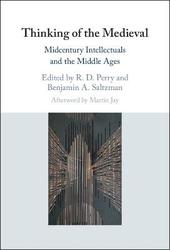
|
Thinking of the Medieval: Midcentury Intellectuals and the Middle Ages
Hardback
Main Details
| Title |
Thinking of the Medieval: Midcentury Intellectuals and the Middle Ages
|
| Authors and Contributors |
Edited by Benjamin A. Saltzman
|
|
Edited by R. D. Perry
|
| Physical Properties |
| Format:Hardback | | Pages:290 | | Dimensions(mm): Height 234,Width 160 |
|
| Category/Genre | Literature - history and criticism
Literary studies - classical, early and medieval |
|---|
| ISBN/Barcode |
9781108478960
|
| Classifications | Dewey:909.07 |
|---|
| Audience | |
|---|
| Illustrations |
Worked examples or Exercises
|
|
Publishing Details |
| Publisher |
Cambridge University Press
|
| Imprint |
Cambridge University Press
|
| Publication Date |
13 October 2022 |
| Publication Country |
United Kingdom
|
Description
The mid-twentieth century gave rise to a rich array of new approaches to the study of the Middle Ages by both professional medievalists and those more well-known from other pursuits, many of whom continue to exert their influence over politics, art, and history today. Attending to the work of a diverse and transnational group of intellectuals - Hannah Arendt, Erich Auerbach, W. E. B. Du Bois, Frantz Fanon, Erwin Panofsky, Simone Weil, among others - the essays in this volume shed light on these thinkers in relation to one another and on the persistence of their legacies in our own time. This interdisciplinary collection gives us a fuller and clearer sense of how these figures made some of their most enduring contributions with medieval culture in mind. Thinking of the Medieval is a timely reminder of just how vital the Middle Ages have been in shaping modern thought.
Author Biography
Benjamin A. Saltzman is Assistant Professor of English at the University of Chicago. R. D. Perry is Assistant Professor, Department of English and Literary Arts, University of Denver.
Reviews'This fascinating volume promises to make a valuable intervention in medieval studies and a rich and challenging contribution to our understanding of the life of the Middle Ages in modernity.' Josh Davies, King's College London
|